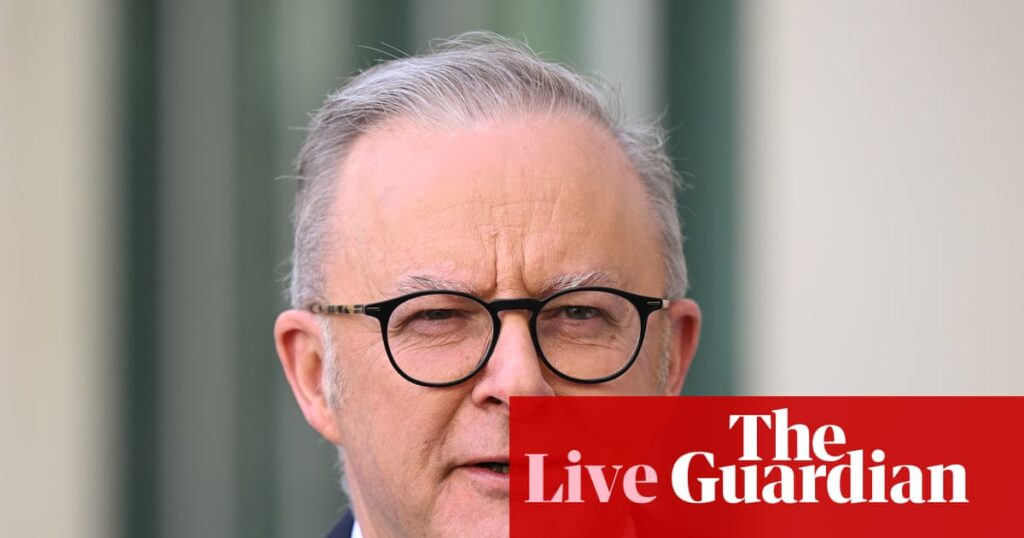Key events
eSafety commissioner says new industry codes meant to address concern with ‘addictive’ AI chatbots
Julie Inman Grant, the eSafety commissioner, spoke about the commission’s six new industry codes meant to better protect children from “lawful but awful” age-inappropriate content, saying the government was concerned about “addictive” AI chatbots.
Inman Grant told RN Breakfast this morning the commission had been concerned about the bots for “some time”, pointing to concerns some young children aged 11 or 12 were spending hours a day talking to them. She said:
They use anthropomorphism to mimic real human conversation, and they also use a bit of sycophancy to reinforce all your beliefs and to keep you chatting. And the problem with children who don’t have the cognitive ability to really ascertain what is real and what is not, in terms of a relationship with a human versus a computer program, this has led to some tragic outcomes.
Inman Grant went on to point to troubling cases in the US linked to chatbots, saying Australia needed to take steps to prevent those from happening at home:
We need guardrails and we don’t need a body count or ruined or lost lives like we’ve seen in the US here in Australia.
Murray Watt to outline new environmental protection laws
Dan Jervis-Bardy
The planned rewrite of federal nature protection laws will provide for development “no-go” zones under a new regional planning regime for major projects, the environment minister, Murray Watt, will confirm today.
The minister will use an address to the same Smart Energy Queensland conference that Larissa Waters is speaking at to sketch out the first details of his overhaul of the Environment Protection and Biodiversity Conservation Act (EPBC), which he plans to introduce to federal parliament before the end of the year.
In the speech, Watt will argue that a shift from project-by-project assessments to a region-wide planning system – with clearly defined “no go” zones for construction – can help speed up projects and better protect nature.
He will say:
Regional planning improves environmental outcomes by better managing threats to nature, identifying areas of high environmental sensitivity that should not be developed and guiding restoration activities in areas that have been degraded.
Regional planning also benefits business by providing better information on local environmental values, to enable informed planning and decision-making, identifying areas where development will simply not be allowed, and areas where individual project assessment and approval would not be required.
This approach – identifying “go” and “no go” zones in various regions upfront – would shift the focus from project-by-project development, to effective planning for our environment and for sustainable development.
Watt last month flagged his support for “no-go” zones in an interview with Guardian Australia after approving the contentious Robbins Island windfarm in Tasmania.
Good morning, Nick Visser here to take over from Martin Farrer. Let’s get to it.

Anne Davies
New Homes NSW website will make system more accessible and efficient, minister says
The NSW minister for customer service and digital government, Jihad Dib, said:
Homes NSW’s move to nsw.gov.au is part of our government’s commitment to deliver accessible, inclusive, secure and integrated digital services for everyone in NSW, regardless of age, ability, background or circumstance.
Housing and homelessness minister Rose Jackson said:
When we brought housing and homelessness services together under Homes NSW, we committed to making the system more efficient and accessible – this digital transformation is proof of that.
Rather than trawling through multiple different websites, you can now head to the Homes NSW website for everything from emergency housing and maintenance information to design guides for our
project partners.
Homes NSW supports more than 260,000 people in social housing across the state.

Anne Davies
New digital portal for Homes NSW
Finding emergency housing in New South Wales or applying for social or key worker housing will be made easier with the launch of a new digital portal that brings together information and services for clients of Homes NSW.
The new tools are part of a digital transformation project that aims to use technology to help vulnerable groups.
It includes a housing office finder and allocation zone locator to determine where people can apply for social housing, as well as a social housing building projects finder to locate where Homes NSW is delivering new social and affordable housing across NSW.
It also aims to make the process of paying rent, lodging maintenance requests or providing feedback more straightforward through the digital portal.
The site includes an embedded translation tool that can instantly translate pages into more than 70 different languages.
Greens warn against new taxes on electric vehicles

Tom McIlroy
More on the speech we’re expecting from Greens leader Larissa Waters later today at the Smart Energy Conference in Brisbane.
She will discuss federal Labor’s plans for road user charging rules for electric vehicles, the design of which is being sped up following last month’s economic reform roundtable.
Waters says new taxes on electric vehicles and trucks – as flagged by treasurer Jim Chalmers – would be a backwards step.
“A poorly designed policy that just taxes these emerging technologies would be a disaster for transport emissions,” she will say.
“But based on the treasurer’s words to date, he seems fine to tax EV drivers and electric trucks while companies like BHP continue to enjoy half a billion dollars in completely tax free fuel.
“The Greens want to see tax settings that get petrol cars off the road and see people take up all kinds of electric transport – public transport, e-transport and electric vehicles.”
Oil and gas giants will be winners if Labor ducks net zero, Waters to say

Tom McIlroy
The Greens leader, Larissa Waters, says multinational oil and gas companies will be the biggest winners if the Albanese government squibs it on a new climate emissions reduction target for 2035.
Labor is preparing to release its 2035 emissions reduction target this month, before the prime minister heads to the UN general assembly in New York.
A 2035 target range of about 65% reductions on 2005 levels is expected, lower than environmental groups would be satisfied with.
Waters, in a speech to the Smart Energy Conference in Brisbane later today, will argue that targets are “a zero sum game”.
She will say:
Someone wins and someone loses.
With a low Australian target, international coal and gas corporations win, their profits go up while Australians are the ones who have to pay for it in insurance premium increases, in cleaning up after floods and cyclones and in lost profits for farmers and more expensive food for us.
Who would lose the most with high targets? Gas companies like Woodside – who also happen to be on the board of the [Business Council of Australia].
Business Council modelling released last week suggested that a 2035 target of 60% would require at least $400 billion in new capital investment.
Waters calls that modelling “highly contested” and says the Greens will be following advice from climate scientists.
And the science says to maintain global temperatures below 2 degrees we need to be at net zero by 2035, putting us at the forefront of a swiftly decarbonising world.
Strong economy, clean renewable energy, reduced emissions. Seems pretty straightforward to me.
Albanese heads to Vanuatu to sign new security and economic agreement

Tom McIlroy
Anthony Albanese will arrive in Vanuatu today where he is expected to sign a new $500m deal on security and economic ties.
Named for a traditional meeting place, the “Nakamal” agreement has been under negotiation for months and comes as China works to gain increased power across the Pacific.
Australia is trying to counter that effort, including with funding for data centres and security infrastructure.
Albanese will meet his counterpart, prime minister Jotham Napat, to sign the agreement and is expected to visit the country’s president, Nikenike Vurobaravu.
After the one-day visit to the capital, Port Vila, Albanese will fly to the Solomon Islands for the Pacific Islands Forum.
The regional gathering, the most important for Pacific countries, will take place in Honiara. Australia has joined countries including New Zealand, France, Fiji, Tuvalu and the US in criticising the decision to block “dialogue partner” countries from attending the meeting.
The US and China will be watching the event closely.
After the forum, Albanese heads home, before a busy September of travel, including trips to Papua New Guinea, the US and the UK.
Albanese will mark 50 years of PNG’s independence from Australia, before heading to the UN general assembly in New York and then holding talks with UK prime minister, Keir Starmer, later in the month.
Welcome
Good morning and welcome to our live news blog. I’m Martin Farrer with the top overnight stories and then it’ll be Nick Visser with the main action.
Anthony Albanese is expected to sign a security and economic agreement with Vanuatu as he arrives in the Pacific island’s capital of Port Vila today. He will meet his counterpart Jotham Napat before they travel to Honiara for the Pacific Islands Forum leaders’ meeting.
The Greens leader, Larissa Waters, will today warn that multinational oil and gas companies will be the biggest winners if the Albanese government squibs it on a new climate emissions reduction target for 2035.
The planned rewrite of federal nature protection laws will provide for development “no-go” zones under a new regional planning regime for major projects, the environment minister, Murray Watt, will confirm today.

